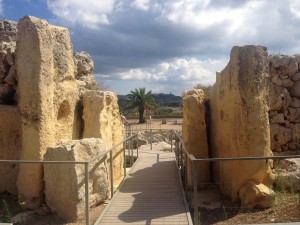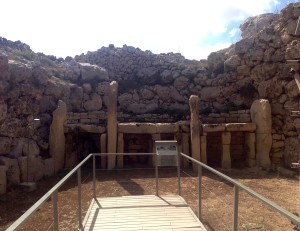In the Temple of Giants
Posted on June 2, 2016I happen to have been born in the Mediterranean island nation of Malta, a tiny and exquisite honey-colored series of dots, in the exact middle of the Med. Last year I visited for a few weeks, having not been there for many decades, and feeling the need to dig up some memories. It was one of the best decisions of my life.
For one thing I hadn’t had a proper holiday for years, and for another, the place where one was born surely holds a singular position in the soul and the bones.
Malta’s a fascinating jewel of a place, with a history and culture that are unique, deep and rich. I spent a lot of time exploring ancient monuments and temples. Eons ago the country was a seat of matriarchal religion, which I found particularly compelling.
One day I decided to visit Malta’s sister island of Gozo, a dot in the turquoise water that’s even smaller and more rustic that the “mainland”. I wanted to revisit some childhood haunts and also go to the oldest temple of all, Ggantija.
As the islands have been conquered so very many times over the centuries, the Maltese language is tricky, an esoteric combination of an obscure version of Arabic and an offshoot of the Romance languages, and is almost impossible to pronounce just by looking.
On the day I visited Gozo, I’d been wrestling with the name of a local beach, Ghajn Tuffieha, and the Maltese name for Gozo, Ghawdex (no, not “Gordex”, as though it were a ’60s’ man-made textile, but “Ow-desh”).
Also, for the love of god, “xkupilja tas-snien”, which means, as you’ve probably worked out yourself, toothbrush. But then there are “banana” and “desk” which mean… well, again, you’ve worked that out.
I caught the car ferry to Gozo and made a beeline for Ggantija, the world’s oldest existing free-standing structure.
Having pronounced myself unable to figure out how to say Maltese words, when I paid my entrance fee at Ggantija and asked how to say it, and the slightly jaded young lady, to whom it was clearly, and rightly, obvious, answered “gigantia”, it was a bit of a palm-to-forehead moment. GIGANTIA – of course – the temple of giants.
Ggantija is more than 5,500 years old, older than the Giza Pyramids. It features astronomical and solar alignments, and some of the stones are so huge and heavy, and the statues, of voluptuous, fertile women, so enormous, that legend says giants may have been involved.
But nobody really knows who built any of the Neolithic structures on Malta because, around 2,500 BC, everyone disappeared. Gone. The next settlers arrived in 2,400 BC, but for that hundred years, nobody – though there were, and this is A True Fact, DWARF ELEPHANTS!!
Here’s an article about Ggantija, which talks about the idea that giants inhabited Gozo and built the temple. Disclaimer – in the first line the writer states that the islands of Malta are floating in the Mediterranean so, you know, grain of salt, scientifically speaking. But as so little is known about the megalithic, Neolithic period of Malta’s history, I find this whole thing fascinating.
The idea that there might have been giants came to mind a few weeks ago when, to my surprise, a dear friend and colleague referred to me as A GIANT.
Now, I’m 5’4″, with the bones of a sparrow, so not exactly physically a giant. But in terms of personality and potential, maybe so. Self-help people talk a lot about “playing big”, by which they mean overcoming one’s fears and going for it.
Yet it seems to me that many of us veer wildly between feeling we’re too small and too big. Too weak, too ineffectual, too uneducated, too unconnected, too broke, too old, too young, too broken.
Or too loud, too smart, too opinionated, too candid, too quick, too discerning, too open, too strong…
When you write or say “too” that many times, it starts to lose its meaning, which is, in this context – what, exactly? Notice I didn’t say “too [whatever] for [something]”, because there doesn’t need to be a something. We just believe ourselves to be TOO, TOO, TOO…
How would it be to believe we are perfect as we are? Like Goldilocks, our ideas of what is perfect – the mean, the average, the acceptable – might simply be irrelevant and illusory, merely holding us back from seeing, believing and loving what we have and who we are.
Malta is tiny, but its history, its geographical location, its strategic importance in many wars, battles and conquests, all give it a significance way beyond its actual size. When you are there, everything conspires to make you feel you might be at the center of the universe, the seat of civilization.
Giant people, dwarf elephants. I like to think that the reason the giants disappeared was that the elephants forgot they were dwarves and trampled the giants to death. I picture them trumpeting reminders to each other that they are, after all, elephants, then galloping on their tiny feet towards the tree trunk-like legs of the giant women who tower above them…
The truth is, we may never know.






Oh this is magnificent and gigantic and all the big words.
I had no idea there was such a thing as The Temple of Giants, a matriarchal religion?
Now I want to visit.
Beautiful.
Sas, I KNOW. It is magical and mysterious beyond words. Let’s go!! xoxo